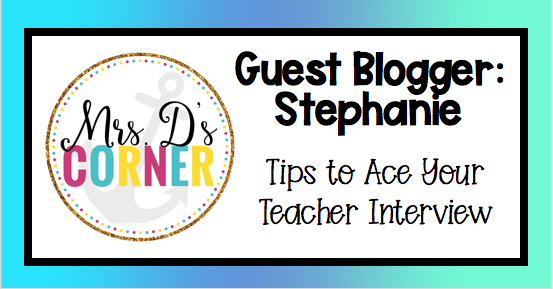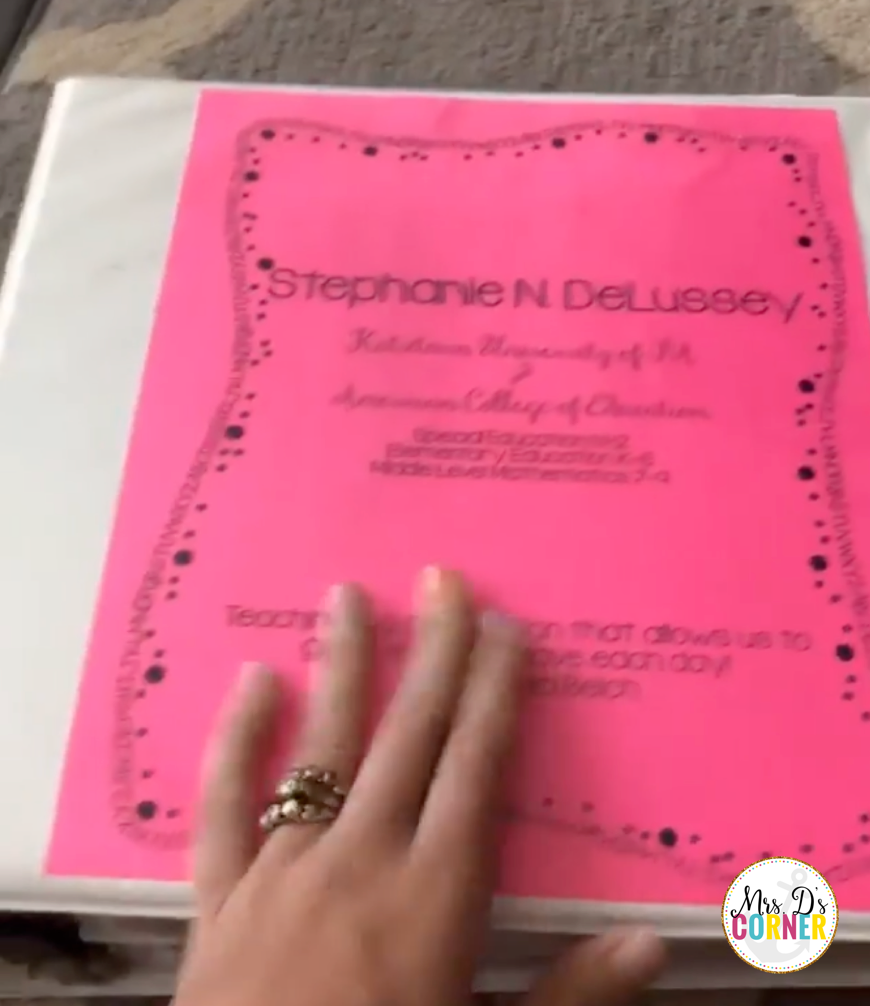I’m excited to introduce this week’s guest blogger: Stephanie from Mrs. D’s Corner to talk all about teacher interviews!

Stephanie is a dual-certified special education teacher, children’s book author, and teacher mentor currently residing in Florida. She has a passion for creating engaging, adapted resources for teachers and students with special needs, and is a self-proclaimed #datanerd. She also provides professional development for teachers at colleges, conferences, and for schools. You can connect with her at Mrs. D’s Corner and The Intentional IEP.
Stephanie is also a huge mental health advocate, sharing her experiences and struggles to let others know that you can survive the dark seasons and thrive in life and teaching with a mental illness.
Teacher interviews can be stressful, but if you are prepared and do some leg work beforehand – you’ll be set to go.
As a special education teacher who has never been on the traditional path of education (ya know, the work 35+ years in one school and then retire), I’ve been on my fair share of interviews. My husband and I move around a lot for his work, so I’ll be honest and say that I have worked in 5 different states and at multiple different schools. Also, I’m currently a licensed teacher in 3 different states – phew!
With all of this moving, it’s given me a lot of time to hone in on my interview skills, as well as perfect my bag of goodies that I take with me on interviews. Oh yeah, and the resume too!
Today I’m going to share 3 different aspects that go hand-in-hand when it comes to teaching interviews: your resume, your interview bag, and the actual interview.

Tip 1: Keep your resume short – I mean no longer than 2 pages. And if it is 2 pages, make sure you print it front-back when you go to interviews or to educational job fairs.
Tip 2: Your resume doesn’t have to be fancy, and honestly – my resume uses a Word resume template. #iknow You don’t need to buy a resume template to stand out. Schools and potential admin don’t really care about the frills and fancy fonts.
Tip 3: My biggest piece of advice when it comes to writing your teacher resume is to let google be your best friend to find those key words and verbs for your job duties. So, for example, let’s say you taught Resource. Google something like, “Resource Teacher Job Duties” and take note of the wording they use in the job posting. Most of the online job posting websites districts use, even the school specific ones, have systems that look for those key words in resumes. So use that to your advantage!
Obviously don’t say you did something you didn’t do, but do some Googling to see different job duties and then use the keywords and verbs for what you have done!

On Instagram, I shared all about my interview bag. You can see the specific details in this IG Highlight, but what I will tell you is this:

Tip 1: Make sure that you’re prepared to answer questions appropriately, professionally, and accurately. Here are some of the most common questions asked in a Special Education Teacher Interview, and if you’re a paraprofessional, I have a list of questions for you to study as well.
Tip 2: If you are nervous, which is completely normal and you’re allowed to be nervous!, take a small paperclip with you and keep it in your hands on your lap. This gives you something small and discrete to keep your fidgeting hands busy while you’re in the interview.
Tip 3: Never lie or make up stories during an interview. Be honest! If you don’t know the answer to a question, don’t have experience with something (but are willing to learn!), tell the interview team that.
Tip 4: Dress appropriately. Dress pants, a dressy shirt (not a t-shirt), nice shoes (no sneakers). There’s this saying out there to “dress for the job that you want”… but honestly, you can never really overdress for a teaching interview. Now don’t show up in a ballgown Cinderella, but dress for the job you want… even if you will be wearing jeans, sneakers, and a t-shirt in a self contained setting every day.
I could talk for days about nailing teacher interviews and getting the job, but this is a great starting place for you to be prepared for your next interview AND to get that new job. You can do it, and I can’t wait to hear about it!
You can find me on Instagram here and on my own website, Mrs. D’s Corner, here.
Instagram | TeachersPayTeachers | Facebook | Boom Learning Library | Pinterest | Youtube
What are you looking for?
COPYRIGHT © 2025 Full SPED Ahead